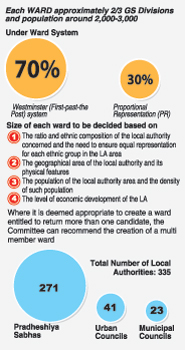News
Parliament set to approve new election laws
Legislation to bring about the most significant changes in the election laws of the country since 1978 are set to be approved by Parliament on Wednesday, by way of amendments to the Local Authorities Elections Act.
This is seen as the first step in the long drawn out efforts to do away with the Proportional Representation (PR) or “manape’ system of electing members to representative bodies in the country.
The amendments to the Local Authorities Elections Act and a related piece of legislation are set to be passed in the Committee Stage (Third reading of Bill), where they have been stalled since January last year, after the Government postponed their final approval by Parliament, due to reservations expressed by certain political parties, that all ethnic groups would not be adequately represented under the new system.
“Now that all party leaders have agreed it should be passed on the 10th, I hope it will be passed without further delay,” said Chief Government Whip Minister Dinesh Guanwardena, head of the Parliamentary Select Committee which made the necessary recommendations to change the election laws.

The Minister said everyone understands that the PR or manape system is a cancer that has to be rooted out of the political system, as every Party faces the same problems created by it.
The amendments will see the restitution of the Local Authorities (LA) in the country based on the Ward System which existed prior to 1978. Each LA area will consist of several wards, and each ward will elect a representative to the LA under the Westminster (First-Past-the-Post) system.
Those elected in this manner will constitute 70% of members of an LA, while the remaining 30% will be elected under the PR system, according to the votes polled by the parties and under certain other criteria. A Delimitation Committee will be established by the Minister of Local Government and Provincial Councils once the Bills are passed. The Committee is tasked with demarcating each LA area into Wards, determining their boundaries and assigning a name and number for each Ward.
Each Ward will be constituted taking into consideration the ratio and ethnic composition of the LA concerned, and the need to ensure equal representation for each ethnic group in the LA area, the geographical area of the LA and its physical features, the population and the density of such population of these areas and the level of economic development of the LA.
The Committee can also recommend the creation of multimember Wards where each Ward can return more than one member.
Minister Gunawardena said that certain amendments will be moved at the Committee Stage, such as the persons becoming members of the Delimitation Committee as well as to allow for a person contesting a particular Ward, to be a resident within the LA area, and not within the particular Ward.
“We have discussed election law amendments for years. The 1978 Constitution did not accommodate anyone, but we have been very democratic, and the Parliamentary Select Committee allowed representatives from all political parties to express their views,” he said.
Minister Gunawardena said this will bring about a big change in the way elections are held in the country, and could be taken forward to the Provincial Council elections and Parliamentary elections laws as well.
He added that the Ward system would be in place when the next LA elections are held in 2015. “The work of the Delimitation Committee should take up to a year. All the necessary data is available to the Committee, but they will have to hear evidence from district to district, before finalising their work,” he said.
Minister Gunawardena said the main emphasis in the Local Government system is to strengthen and give more power to the grassroot level. “Once the Ward system is created, each Ward member will be responsible for his area.”
He recalled that many of the country’s leaders such as S.W.R.D. Bandaranaike, J.R. Jayewardene and Dr. N.M. Perera emerged through the Local Government Ward system. “They ran for Local Government office and rose to the highest office in the land.”
The Minister also said that more changes are needed to the election laws, such as the introduction of electronic voting.
Follow @timesonlinelk
comments powered by Disqus



















